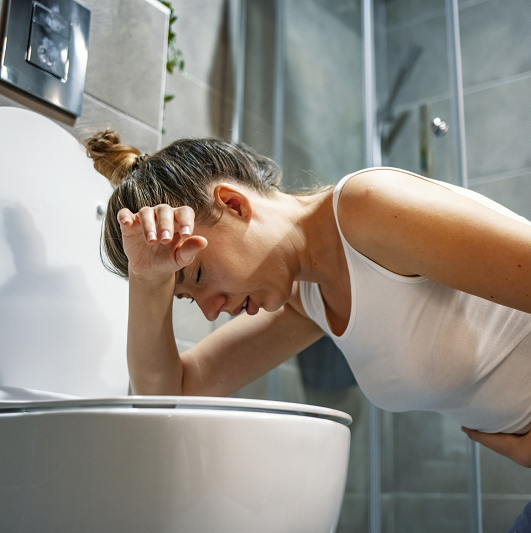Cramp Confusion: Early Pregnancy or Period? Understanding the Difference

October 22, 2024
You’re feeling that all-too-familiar discomfort in your lower abdomen, so your period must be around the corner. Right? Not always. If something feels off (you know your body best), it might actually be early pregnancy cramps.
With so many overlapping symptoms, it’s often hard to decipher whether what you’re feeling is your menstrual cycle gearing up or the first sign of pregnancy. No matter how well you think you know your body, understanding its nuances can be tricky.
To help clear things up, Armina Eana, D.O., a board-certified OB-GYN affiliated with Palisades Medical Center, is shedding some light on the differences between these types of cramps.
Period or Pregnancy Cramps: What’s the Difference?
For many women, the sensation of uterine cramping occurs both during early pregnancy and just before a period. According to Dr. Eana, the key differences between the two lie in the timing, intensity and other associated symptoms.
“Period cramps typically start a day or two before your period,” Dr. Eana explains. “They tend to be more intense, with a throbbing pain that can radiate to your lower back and even down your legs.”
On the other hand, pregnancy cramps are usually milder and might feel like a pulling or tingling sensation.
“Pregnancy cramps can start as early as a week before your period is due,” Dr. Eana adds, “and are often localized in the lower abdomen, right around the pubic bone.”
While the timing can be a clue, it’s important to remember that every woman’s body is different. Some women experience intense period-like cramps during early pregnancy, while others may not have cramps at all. "There are women who don't experience any cramping during early pregnancy," says Dr. Eana, highlighting how varied symptoms can be.
What Do Early Pregnancy Cramps Feel Like?
If you’re wondering what early pregnancy cramps feel like, think subtle. These cramps are usually less severe than period cramps and they tend to come and go rather than lingering for days.
“Pregnancy cramps often feel like a dull pulling or pressure,” Dr. Eana explains. “Women sometimes describe a tingling sensation that feels different from their usual menstrual cramps.”
These sensations are often linked to the early stages of pregnancy, including the implantation process. "Implantation pain can occur about six to 12 days after conception, often a week or more before a period is due,” says Dr. Eana. During this time, a fertilized egg attaches to the lining of the uterus, which can cause light cramping.
Another potential clue that your cramps are pregnancy-related is implantation bleeding. This light spotting sometimes goes along with cramping and is often mistaken for the start of a period.
“Implantation bleeding tends to be light and often appears as pink, brown or dark red spotting,” Dr. Eana clarifies. “It usually lasts one to two days and may not require a pad or tampon.”
If your bleeding is heavier or looks more like your regular period, it’s more likely that your menstrual cycle has begun. But if the spotting is lighter than usual and you’re experiencing cramping, it might be worth taking a pregnancy test.
Symptoms Beyond the Cramps
Even though cramping is a common symptom of both early pregnancy and menstruation, look for other signs that could help distinguish between the two.
“It’s hard to rely on cramps alone to determine pregnancy because of the overlap in symptoms,” says Dr. Eana.
One clear-cut symptom to look for is nausea, which is more commonly associated with pregnancy than with menstruation. Infamous morning sickness can start as early as a few weeks into pregnancy, but it’s less common for women to experience nausea as part of premenstrual syndrome (PMS).
Other early pregnancy symptoms to watch for include:
- Breast tenderness: While both PMS and pregnancy can cause breast sensitivity, pregnancy-related breast changes may feel more pronounced.
- Fatigue: If you’re suddenly feeling unusually tired, it could be a sign of pregnancy. Hormonal changes during early pregnancy can leave you feeling more fatigued than usual.
- Missed period: Of course, the most obvious sign of pregnancy is a missed period.
So how can you tell whether your cramps are related to pregnancy or just your period? Timing and intensity are your biggest clues, but it varies for each woman.
“If your cramps are milder than usual, occur earlier in your cycle, or are accompanied by other symptoms like nausea or fatigue, there’s a chance you could be pregnant,” Dr. Eana says.
What If You’re Still Unsure?
If you’re still confused about whether your cramps are signaling pregnancy or period, it’s best to be proactive.
"A pregnancy test is the most definitive way to know for sure,” advises Dr. Eana. “And your health care provider can help you rule out other potential causes of cramping, such as ovarian cysts or fibroids, which can sometimes mimic the symptoms of early pregnancy or PMS.”
If you’re concerned about your symptoms, it’s always better to err on the side of caution and turn to a health care professional. Every woman’s body is different, so pay attention to what you’re feeling and seek help, if needed.
Next Steps & Resources
- Meet our experts: Armina Eana, D.O.
- To make an appointment with a doctor near you, call 800-822-8905 or visit our website.
- Learn more about our women’s health services.
The material provided through HealthU is intended to be used as general information only and should not replace the advice of your physician. Always consult your physician for individual care.






